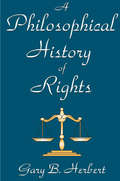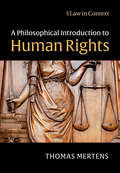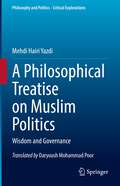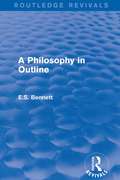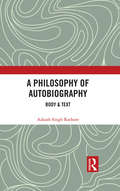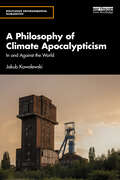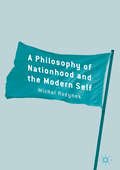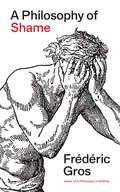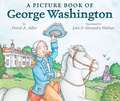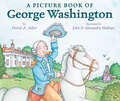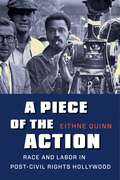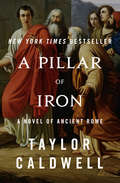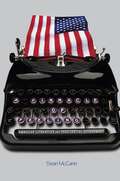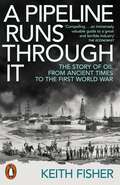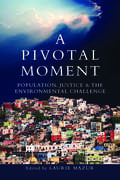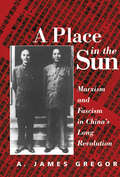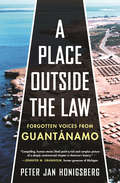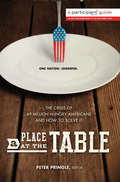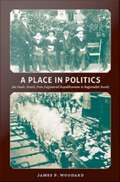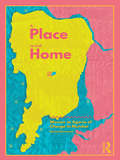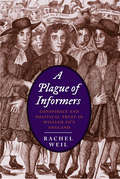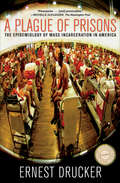- Table View
- List View
A Philosophical History of Rights
by Gary HerbertSince the seventeenth century, concern in the Western world for the welfare of the individual has been articulated philosophically most often as a concern for his rights. The modern conception of individual rights resulted from abandonment of ancient, value-laced ideas of nature and their replacement by the modern, mathematically transparent idea of nature that has room only for individuals, often in conflict. In A Philosophical History of Rights, Gary B. Herbert traces the historical evolution of the concept and the transformation of the problems through which the concept is defined. The volume examines the early history of rights as they existed in ancient Greece, and locates the first philosophical inquiry into the nature of rights in Platonic and Aristotelian accounts. He traces Roman jurisprudence to the advent of Christianity, to the divine right of kings. Herbert follows the historical evolution of modern subjective rights, the attempts by Locke, Rousseau, Kant, Fichte, and Hegel to mediate rights, to make them sociable. He then turns to nineteenth-century condemnation of rights in the theories of the historical school of law, Benthamite utilitarianism, and Marxist socialism. Following World War II, a newly revived language of rights had to be constructed, to express universal moral outrage over what came to be called crimes against humanity. The contemporary Western concern for rights is today a concern for the individual and a recognition of the limits beyond which a society must not go in sacrificing the individual's welfare for its own conception of the common good. In his conclusion, Herbert addresses the postmodern critique of rights as a form of moral imperialism legitimizing relations of dominance and subjection. In addition to his historical analysis of the evolution of theories of rights, Herbert exposes the philosophical confusions that arise when we exchange one concept of rights for another and continue to cite historical antecedents for contemporary attitudes that are in fact their philosophical antithesis. A Philosophical History of Rights will be of interest to philosophers, historians, and political scientists.
A Philosophical Introduction to Human Rights (Law in Context)
by Thomas MertensWhile almost everyone has heard of human rights, few will have reflected in depth on what human rights are, where they originate from and what they mean. A Philosophical Introduction to Human Rights – accessibly written without being superficial – addresses these questions and provides a multifaceted introduction to legal philosophy. The point of departure is the famous 1948 Universal Declaration of Human Rights, which provides a frame for engagement with western legal philosophy. Thomas Mertens sketches the philosophical and historical background of the Declaration, discusses the ten most important human rights with the help of key philosophers, and ends by reflecting on the relationship between rights and duties. The basso continuo of the book is a particular world view derived from Immanuel Kant. 'Unsocial sociability' is what characterises humans, i.e. the tension between man's individual and social nature. Some human rights emphasize the first, others the second aspect. The tension between these two aspects plays a fundamental role in how human rights are interpreted and applied.
A Philosophical Treatise on Muslim Politics: Wisdom and Governance (Philosophy and Politics - Critical Explorations #21)
by Mehdi Hairi YazdiThis is a translation of Mehdi Hairi Yazdi’s حکمت و حکومت (Ḥikmat wa Ḥukūmat) which provides a philosophical critique of the theory of the guardianship of the jurist. This theory is currently the governance theory in Iran and Mehdi Hairi Yazdi’s treatise provides a critique based on both philosophical and traditional arguments. It asks numerous questions, such as: ‘Is the governance of jurists philosophically coherent, rational and efficient?’ and ‘How can Muslim communities have their own forms of governance in such a manner that their faith commitments are met while living in their own time without clashing with universal values of governance?’ and debunks the key foundation of the guardianship of the jurist. The present translation makes accessible, for the first time, the text of this critique in English, and provides a competing narrative based on his theory of joint public ownership in political theory.
A Philosophy in Outline (Routledge Revivals)
by E.S. BennettFirst published in 1931, this book provides a brief overview of the essentials of philosophy. It aims to combat the notion of the inaccessibility of philosophy by providing an introduction to its history and what the author believes to a ‘minimum dose…of incontrovertible philosophical truth’. The book merely assumes an ordinary level of adult education and offers an outline of the key areas of philosophy — consciousness, reality, experience, Life, God, love, aesthetics, conduct, logic — and as such will be of interest as a very useful starting point for anyone wishing to undertake further studies.
A Philosophy of Autobiography: Body & Text
by Aakash Singh RathoreThis book offers intimate readings of a diverse range of global autobiographical literature with an emphasis on the (re)presentation of the physical body. The twelve texts discussed here include philosophical autobiography (Nietzsche), autobiographies of self-experimentation (Gandhi, Mishima, Warhol), literary autobiography (Hemingway, Das) as well as other genres of autobiography, including the graphic novel (Spiegelman, Satrapi), as also documentations of tragedy and injustice and subsequent spiritual overcoming (Ambedkar, Pawar, Angelou, Wiesel). In exploring different literary forms and orientations of the autobiographies, the work remains constantly attuned to the physical body, a focus generally absent from literary criticism and philosophy or study of leading historical personages, with the exception of patches within phenomenological philosophy and feminism. The book delves into how the authors treated here deal with the flesh through their autobiographical writing and in what way they embody the essential relationship between flesh, spirit and word. It analyses some seminal texts such as Ecce Homo, The Story of My Experiments with Truth, Waiting for a Visa, I Know Why the Caged Bird Sings, A Moveable Feast, Night, Baluta, My Story, Sun and Steel, The Philosophy of Andy Warhol, MAUS and Persepolis. Lucid, bold and authoritative, this book will be of great interest to scholars and researchers of philosophy, literature, gender studies, political philosophy, media and popular culture, social exclusion, and race and discrimination studies.
A Philosophy of Climate Apocalypticism: In and Against the World (Routledge Environmental Humanities)
by Jakub KowalewskiThis book offers a long-overdue analysis of the ubiquity of eco-apocalypticism in current discourses on the climate crisis.Drawing on a wide range of sources and theoretical traditions from ecological works and radical pamphlets, through political theology and continental philosophy to ancient and medieval apocalypses, the book sheds a comprehensive light on the concepts, processes, and experiences which circulate around the figure of the environmental end of the world. Importantly, this book argues that apocalypticism can provide a productive philosophical framework for addressing the climate catastrophe, enabling us to propose a distinctive answer to the fundamental question which haunts progressive ecological projects: how can we defend the world we find indefensible?Appealing to students, academics, and researchers in philosophy, political theology, and environmental humanities, this book is a timely intervention which hopes to demonstrate that, when all else fails, it is the end of the world which may save the planet.
A Philosophy of Nationhood and the Modern Self
by Michal RozynekThis book delves into the philosophical presuppositions of modern political agency. Michal Rozynek explores the place of nationalism in an increasingly cosmopolitan world by approaching the fundamental questions of modern subjectivity from a new angle. Taking as a starting point the transformations of the modern self, this volume argues that the project of modernity leads to an unresolvable tension within the self-- one which seemingly jeopardizes our ability to participate in a public world. Rozynek goes on to show how nationhood can offer a resolution to this tension, building on the pioneering work of Liah Greenfeld. Far from being a defense of tribalism, this book attempts to tackle both the questions of national solidarity and cosmopolitan duties, by problematizing the account of nationalism in contemporary political theory and advocating a revised model of universalism.
A Philosophy of Shame: A Revolutionary Emotion
by Frédéric GrosAn original reflection on shame as the central feeling of our age — the expression of an anger that is the necessary condition for new strugglesCan shame become a source of political strength? Faced with injustice, growing inequality and systemic violence, we cry out in shame. We feel ashamed of obscene wealth amid wider deprivation. We feel ashamed of humanity for its ruthless and relentless exploitation of the earth. We feel ashamed of the racism and sexism that permeate society and our everyday lives.This difficult emotion is not just sadness or a withdrawal into oneself, nor is it a paralysing sense of inadequacy. As Frédéric Gros argues in A Philosophy of Shame, it arises when our perception of reality rejects passivity and resignation and instead embraces imagination. Shame thus becomes the expression of an anger that is a powerful, transformative force —one that assumes a radical character.In dialogue with authors such as Primo Levi, Annie Ernaux, Virginie Despentes and James Baldwin, Gros explores a concept that is still little understood in its anthropological, moral, psychological and political depths. Shame is a revolutionary sentiment because it lies at the foundation of any path of subjective recognition, transformation and struggle.
A Picture Book of George Washington
by David A. AdlerA simple presentation of George Washington's character and the major events of his life.
A Picture Book of George Washington (Picture Book Biography)
by David A. AdlerThe life and legacy of our nation's first president, also known as commander of the Continental Army, husband to Martha, and an avid farmer and equestrian. Over two hundred years after his death, George Washington remains one of the most studied figures in American history. This clear and concise picture book biography covers the important facts and historical background, complemented by charming illustrations. The text details Washington's early life as well as the Revolutionary War and his impressive career as leader of the newly formed United States. Young readers will love learning more about the man who was "first in war, first in peace, and first in the hearts of his countrymen." Back matter features a timeline. For almost thirty years, David Adler&’s Picture Book Biography series has profiled famous people who changed the world. Colorful, kid-friendly illustrations combine with Adler&’s &“expert mixtures of facts and personality&” (Booklist) to introduce young readers to history through compelling biographies of presidents, heroes, inventors, explorers, and adventurers. These books are ideal for first and second graders interested in history, or who need reliable sources for school book reports.
A Picture Book of Samuel Adams
by David A. Adler Ronald Himler Michael S. AdlerThis is the story of Samuel Adams, American Patriot and a founding father of the new American nation. He wrote and spoke out about the unfair British taxes imposed upon the colonists and helped organize the Stamp Act. He instigated the Boston Tea Party - an act of rebellion by the Sons of Liberty that would lead directly to the Revolutionary War. He was a delegate at the First and Second Continental Congresses, and was one of the signers of the Declaration of Independence in 1776. Adams continued to lead the struggle for liberty until his death. In this book, the Adlers offer a compelling hero for young readers - a man passionate about freedom, and determined to make a difference.
A Piece of the Action: Race and Labor in Post–Civil Rights Hollywood
by Eithne QuinnHollywood is often thought of—and certainly by Hollywood itself—as a progressive haven. However, in the decade after the passage of the Civil Rights Act, the film industry grew deeply conservative when it came to conflicts over racial justice. Amid black self-assertion and white backlash, many of the most heated struggles in film were fought over employment. In A Piece of the Action, Eithne Quinn reveals how Hollywood catalyzed wider racial politics, through representation on screen as well as in battles over jobs and resources behind the scenes.Based on extensive archival research and detailed discussions of films like In the Heat of the Night, Sweet Sweetback’s Baadasssss Song, Super Fly, Claudine, and Blue Collar, this volume considers how issues of race and labor played out on the screen during the tumultuous early years of affirmative action. Quinn charts how black actors leveraged their performance capital to force meaningful changes to employment and film content. She examines the emergence of Sidney Poitier and other African Americans as A-list stars; the careers of black filmmakers such as Melvin Van Peebles and Ossie Davis; and attempts by the federal government and black advocacy groups to integrate cinema. Quinn also highlights the limits of Hollywood’s liberalism, showing how predominantly white filmmakers, executives, and unions hid the persistence of racism behind feel-good stories and public-relations avowals of tolerance. A rigorous analysis of the deeply rooted patterns of racial exclusion in American cinema, A Piece of the Action sheds light on why conservative and corporate responses to antiracist and labor activism remain pervasive in today’s Hollywood.
A Pillar of Iron: A Novel of Ancient Rome
by Taylor CaldwellNew York Times Bestseller: A magnificent novel of ancient Rome and the tragic life of Cicero, who tried in vain to save the republic he loved from tyranny. In this riveting tale, the Roman Empire in its final glory is seen through the eyes of philosopher, orator, and political theorist Marcus Tullius Cicero. From his birth in 106 BC in the hill town of Arpinum, Cicero, the educated son of a wealthy member of the equestrian order, is destined for greatness. At a young age, he discovers the legend of the Unknown God, the coming Messiah, and it propels the rising lawyer on a journey of spiritual conflict and self-discovery. From his tumultuous family life to his tenuous alliance with Julius Caesar to a fateful love affair with the Roman empress Livia and, finally, to the political role that will make him a target of powerful enemies, A Pillar of Iron is the story of Cicero&’s legacy as one the greatest influences on Western civilization. Based on hundreds of speeches, voluminous private correspondence, and ancient texts and manuscripts, this bestselling epic brings into focus Cicero&’s complicated relationships with his contemporaries, including Caesar, Mark Antony, and Crassus, and brilliantly captures the pageantry, turmoil, and intrigue of life in ancient Rome. According to legendary editor Maxwell Perkins, author &“Taylor Caldwell is a storyteller first, last and foremost, and once you begin reading one of her books, you can&’t help finishing it.&” This ebook features an illustrated biography of Taylor Caldwell including rare images from the author&’s estate.
A Pinnacle of Feeling: American Literature and Presidential Government (20/21)
by Sean McCannThere is no more powerful symbol in American political life than the presidency, and the image of presidential power has had no less profound an impact on American fiction. A Pinnacle of Feeling is the first book to examine twentieth-century literature's deep fascination with the modern presidency and with the ideas about the relationship between state power and democracy that underwrote the rise of presidential authority. Sean McCann challenges prevailing critical interpretations through revelatory new readings of major writers, including Richard Wright, Gertrude Stein, Henry Roth, Zora Neale Hurston, Saul Bellow, Ralph Ellison, Norman Mailer, Don Delillo, and Philip Roth. He argues that these writers not only represented or satirized presidents, but echoed political thinkers who cast the chief executive as the agent of the sovereign will of the American people. They viewed the president as ideally a national redeemer, and they took that ideal as a model and rival for their own work. A Pinnacle of Feeling illuminates the fundamental concern with democratic sovereignty that informs the most innovative literary works of the twentieth century, and shows how these works helped redefine and elevate the role of executive power in American culture.
A Pipeline Runs Through It: The Story of Oil from Ancient Times to the First World War
by Keith Fisher'Fascinating revelations' Max Hastings, Sunday Times'An immensely valuable guide to a great and terrible industry' The Economist 'The book I have long been waiting for... Essential reading' Michael KlarePetroleum has always been used by humans: as an adhesive by Neanderthals, as a waterproofing agent in Noah's Ark and as a weapon during the Crusades. Its eventual extraction from the earth in vast quantities transformed light, heat and power. A Pipeline Runs Through It is a fresh, in-depth look at the social, economic, and geopolitical forces involved in our transition to the modern oil age. It tells an extraordinary origin story, from the pre-industrial history of petroleum through to large-scale production in the mid-nineteenth century and the development of a dominant, fully-fledged oil industry by the early twentieth century.This was always a story of imperialist violence, economic exploitation and environmental destruction. The near total eradication of the Native Americans of New York, Pennsylvania and Ohio has barely been mentioned as a precondition for the emergence of the first oil region in the United States. The growth of Royal Dutch-Shell involved the genocidal subjugation of people of the Dutch East Indies and the exploitation of oil in the Middle East arose seamlessly out of Britain's prior political and military interventions in the region. Finally, in an entirely new analysis, the book shows how the British navy's increasingly desperate dependence on vulnerable foreign sources of oil may have been a catalytic ingredient in the outbreak of the First World War.The rise of oil has shaped the modern world, and this is the book to understand it.
A Pivotal Moment: Population, Justice, and the Environmental Challenge
by Tim Wirth Laurie Ann Mazur Martha Farnsworth Riche Susan Gibbs Steve Sinding Tim CohenThrough a series of essays by leading demographers, environmentalists and reproductive health advocates, A Pivotal Moment offers a new perspective on the complex connection between population dynamics and environmental quality. It presents the latest research on the relationship between population growth and climate change, ecosystem health and other environmental issues. It surveys the new demographic landscape--in which population growth rates have fallen, but human numbers continue to increase. It looks back at the lessons learned from half a century of population policy--and forward to proposetwenty-first century population policies that are sustainable and just.A Pivotal Moment puts forth the concept of "population justice," which is inspired by reproductive justice and environmental justice movements. Population justice holds that inequality is a root cause of both rapid population growth and environmental degradation. As the authors in this volume explain, to slow population growth and build a sustainable future, women and men need access to voluntary family planning and other reproductive health services. They need education and employment opportunities, especially for women. Population justice means tackling the deep inequities--both gender and economic--that are associated with rapid population growth and unsustainable resource consumption. Where family planning is available, where couples are confident their children will survive, where girls go to school, where young men and women have economic opportunity--there couples will have healthier and smaller families.
A Place Called Zamora: A Novel (a Dystopian Love Story)
by LB GschwandtnerNiko and El are trapped in a politically corrupt dystopian city where brutality rules. After winning a cynical race where only one rider can survive, Niko tosses aside his chance to join the city&’s corrupt inner circle by choosing lovely, innocent El as his prize—thus upsetting the ruling order and placing them both in mortal danger. With the Regime hunting them and the children of the city fomenting a guerrilla revolt, the two attempt a daring escape to the possibly mythical utopia, Zamora. But as events unfold, the stirrings of love El once felt for Niko begin to morph into mistrust and fear. If they reach Zamora, will Niko ever claim his secret birthright? And what will the future hold if he loses El&’s love?
A Place In The Sun: Marxism And Fascimsm In China's Long Revolution
by A. James GregorChina has endured a century of turmoil, beginning with the anti-dynastic revolution associated with Sun Yat-Sen, through the military and tutelary rule of Chiang Kai-shek, the revolutionary regime of Mao Zedong, and the radical reforms of Deng Xiaoping. China has had little respite. Historians and social scientists have attempted to understand some of this history as being the consequence of the impact of European ideologies-including Marxism, Marxism-Leninism, and Fascism. Rarely instructive or persuasive, the discussions regarding this issue have, more often than not, led to puzzlement, rather than enlightenment.In A Place in the Sun, A. James Gregor offers an interpretation of the role of European Marxist and Fascist ideas on China's revolutionaries that is both original, and based on a lifetime of scholarship devoted to revolutionary ideologies. Gregor renders a detailed analysis of their respective influence on major protagonists. In the exposition, Gregor reveals an unsuspected and complex set of relationships between the Chinese revolution and essentially European ideologies. His discussion concludes with a number of estimations that suggest implications for the future of modern China, and its relationship with the advanced industrial democracies. How post-Dengist China-the world's most populous nation-is to be understood remains uncertain to most comparativists and historians. Gregor provides one well supported alternative, and he is carefully attentive to the implications of this alternative.
A Place Outside the Law: Forgotten Voices from Guantanamo
by Peter Jan HonigsbergFirsthand testimonies from Guantánamo Bay, inspiring future generations to never repeat the human rights violations of the detention center.Law scholar and Witness to Guantánamo founder Peter Jan Honigsberg uncovers a haunting portrait of life at the military prison and its toll, not only on the detainees and their loved ones but also on its military and civilian personnel and the journalists who reported on it.Honigsberg conducted 158 interviews across 20 countries so that the people who lived and worked there could tell their heartbreaking and inspirational stories. In each one, we face the reality that the healing process cannot begin until we start the conversation about what was done in the name of protecting our country. These are a few of them. Many alleged operatives in Guantánamo were purchased by the United States for ransom from Afghan and Pakistani soldiers. Brandon Neely, a prison guard who processed the first group of suspected operatives to arrive in Cuba, flew to London to embrace the detainees he guarded after leaving the military. Navy whistleblower Matt Diaz covertly released the names of 500 detainees by sending them in a greeting card to a lawyer in New York. Journalist Carol Rosenberg committed the past 17 years of her career to documenting life at Guantánamo. And Damien Corsetti, an interrogator who came to be known as the "King of Torture," received ribbons and awards for the same cruel actions for which he was later prosecuted. In startling, aching prose, A Place Outside the Law shines a light on these unheard voices, and through them, encourages the global community to embrace humanity as our greatest tool to make the world a safer place.
A Place at the Table: The Crisis of 49 Million Hungry Americans and How to Solve It
by Peter Pringle Participant MediaForty-nine million people#151;including one in four children#151;go hungry in the U. S. every day, despite our having the means to provide nutritious, affordable food for all. Inspired by the acclaimed documentaryA Place at the Table, this companion book offers powerful insights from those at the front lines of solving hunger in America, including: Jeff Bridges, Academy Award#150;winning actor, cofounder of the End Hunger Network, and spokesperson for the No Kid Hungry Campaign, on raising awareness about hunger Ken Cook, president of Environmental Working Group, unravels the inequities in the Farm Bill and shows how they affect America’s hunger crisis Marion Nestle, nutritionist and acclaimed critic of the food industry, whose latest work tracks the explosion of calories in today’s #147;Eat More” environment Bill Shore, Joel Berg, and Robert Egger, widely-published anti-hunger activists, suggest bold and diverse strategies for solving the crisis Janet Poppendieck, sociologist, bestselling author, and well-known historian of poverty and hunger in America, argues the case for school lunch reform Jennifer Harris, of Yale University’s Rudd Center for Food Policy and Obesity, uncovers the new hidden persuaders of web food advertisers David Beckmann, head of Bread for the World, andSarah Newman, researcher onA Place at the Table, explore the intersection of faith and feeding the hungry Mariana Chilton, Philadelphia pediatrician and anti-hunger activist, tells the moving story of her extraordinary lobby group, Witnesses to Hunger Tom Colicchio, chef and executive producer of television’sTop Chef, presents his down-to-earth case to Washington for increases in child nutrition programs Andy Fisher, veteran activist in community food projects, argues persuasively why we have to move beyond the charity-based emergency feeding program Kelly Meyer, cofounder of Teaching Gardens, illuminates the path to educating, and providing healthy food for, all children Kristi Jacobson and Lori Silverbush, the film’s directors/producers, tell their personal stories of how and why they came to make the documentary Hunger and food insecurity pose a deep threat to our nation. A Place at the Tableshows they can be solved once and for all, if the American public decides#151;as they have in the past#151;that making healthy food available, and affordable, is in the best interest of us all.
A Place in Politics: São Paulo, Brazil, from Seigneurial Republicanism to Regionalist Revolt
by James P. WoodardA Place in Politics is a thorough reinterpretation of the politics and political culture of the Brazilian state of So Paulo between the 1890s and the 1930s. The world's foremost coffee-producing region from the outset of this period and home to more than six million people by 1930, So Paulo was an economic and demographic giant. In an era marked by political conflict and dramatic social and cultural change in Brazil, nowhere were the conflicts as intense or changes more dramatic than in So Paulo. The southeastern state was the site of the country's most important political developments, from the contested presidential campaign of 1909-10 to the massive military revolt of 1924. Drawing on a wide array of source materials, James P. Woodard analyzes these events and the republican political culture that informed them. Woodard's fine-grained political history proceeds chronologically from the final years of the nineteenth century, when So Paulo's leaders enjoyed political preeminence within the federal system codified by the Constitution of 1891, through the mass mobilization of 1931-32, in which So Paulo's people marched, rioted, and eventually took up arms against the national government in what was to be Brazil's last great regionalist revolt. In taking to the streets in the name of their state, constitutionalism, and the "civilization" that they identified with both, the people of So Paulo were at once expressing their allegiance to elements of a regionally distinct political culture and converging on a broader, more participatory public sphere that had arisen amid the political conflicts of the preceding decades.
A Place to Call Home: Women as Agents of Change in Mumbai
by Ramya RamanathAny city is a product of politics and economics, organizations and people. Yet, the life experiences of women uprooted from its poorest quarters seldom inform urban resettlement plans. In this ethnographic field study, Ramya Ramanath, Associate Professor at DePaul University, examines the lives of women displaced by slum clearance and relocated to the largest slum resettlement site in Asia. Through conversations with diverse women of different ages, levels of education, types of employment, marital status, ethnicity, caste, religion, and household make-up, Ramanath recounts how women negotiate a drastic change in environment, from makeshift housing in a park slum to ownership of a high-rise apartment in a posh Mumbai suburb. Each phase of their city lives reflects how women initiate change and disseminate a vision valuable to planners intent on urban and residential transformations. Ramanath urges the concerted engagement of residents in design, development, and evaluation of place-making processes in cities and within their own neighborhoods especially. This book will interest scholars of public policy, women and gender studies, South Asian studies, and urban planning.
A Plague Upon Our House: My Fight at the Trump White House to Stop COVID from Destroying America
by Scott W. AtlasAs seen on Tucker Carlson! What really happened behind the scenes at the Trump White House during the COVID pandemic?When Dr. Scott W. Atlas was tapped by Donald Trump to join his COVID Task Force, he was immediately thrust into a maelstrom of scientific disputes, policy debates, raging egos, politically motivated lies, and cynical media manipulation. Numerous myths and distortions surround the Trump Administration&’s handling of the crisis, and many pressing questions remain unanswered. Did the Trump team really bungle the response to the pandemic? Were the right decisions made about travel restrictions, lockdowns, and mask mandates? Are Drs. Anthony Fauci and Deborah Birx competent medical experts or timeserving bureaucrats? Did half a million people really die unnecessarily because of Trump&’s incompetence? So far no trusted figure has emerged who can tell the story straight—until now. In this unfiltered insider account, Dr. Scott Atlas brings us directly into the White House, describes the key players in the crisis, and assigns credit and blame where it is deserved. The book includes shocking evaluations of the Task Force members&’ limited knowledge and grasp of the science of COVID and details heated discussions with Task Force members, including all of the most controversial episodes that dominated headlines for weeks. Dr. Atlas tells the truth about the science and documents the media&’s relentless campaign to suffocate it, which included canceled interviews, journalists&’ off-camera hostility in White House briefings, and intentional distortion of facts. He also provides an inside account of the delays and timelines involving vaccines and other treatments, evaluates the impact of the lockdowns on American public health, and indicts the relentless war on truth waged by Big Business and Big Tech. No other book contains these revelations. Millions of people who trust Dr. Atlas will want to read this dramatic account of what really went on behind the scenes in the White House during the greatest public health crisis of the 21st century.
A Plague of Informers
by Rachel WeilStories of plots, sham plots, and the citizen-informers who discovered them are at the center of Rachel Weil's compelling study of the turbulent decade following the Revolution of 1688. Most studies of the Glorious Revolution focus on its causes or long-term effects, but Weil instead zeroes in on the early years when the survival of the new regime was in doubt. By encouraging informers, imposing loyalty oaths, suspending habeas corpus, and delaying the long-promised reform of treason trial procedure, the Williamite regime protected itself from enemies and cemented its bonds with supporters, but also put its own credibility at risk.
A Plague of Prisons: The Epidemiology of Mass Incarceration in America
by Ernest DruckerThe public health expert and prison reform activist offers &“meticulous analysis&” on our criminal justice system and the plague of American incarceration (The Washington Post). An internationally recognized public health scholar, Ernest Drucker uses the tools of epidemiology to demonstrate that incarceration in the United States has become an epidemic—a plague upon our body politic. He argues that imprisonment, originally conceived as a response to the crimes of individuals, has become &“mass incarceration&”: a destabilizing force that damages the very social structures that prevent crime. Drucker tracks the phenomenon of mass incarceration using basic public health concepts—&“incidence and prevalence,&” &“outbreaks,&” &“contagion,&” &“transmission,&” &“potential years of life lost.&” The resulting analysis demonstrates that our unprecedented rates of incarceration have the contagious and self-perpetuating features of the plagues of previous centuries. Sure to provoke debate and shift the paradigm of how we think about punishment, A Plague of Prisons offers a novel perspective on criminal justice in twenty-first-century America. &“How did America&’s addiction to prisons and mass incarceration get its start and how did it spread from state to state? Of the many attempts to answer this question, none make as much sense as the explanation found in [this] book.&” —The Philadelphia Inquirer
